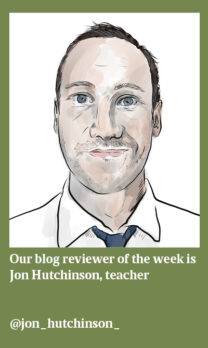Racism and trauma, reopening schools, outdoor learning, reading comprehension and elaborative diacope are Jon Hutchinson’s top picks of the education topics this week
@ieshasmall
Like many people, I have spent much of this week feeling sick about the killing of George Floyd. And like many people, I’ve been left asking “What can I do?”. In this powerful post, Iesha Small answers that it starts with understanding that “continued exposure to racism and its effects creates trauma”. Piercingly, for me at least, Small suggests that we don’t “leave it to the only black person in the room or organisation to bring up race and inequality at work”. I know that as a white person I can never understand the lived experience of racism as a “repeated, insidious, ongoing series of events”, but I can listen and speak. So what can you do? Well, for a start, read this post.
Towards an evidenced-informed approach to prioritising curriculum-led outdoor learning
@HeenaDave12
When I’m not teaching, I love to get into the great outdoors. I remember wiling away summer days in my local woods and lament the dearth of knowledge that so many children seem to have about nature. Yet, “outdoor learning” often gets a bad rep, synonymous with woolly planning and juxtaposed from the rigorous instruction and rich knowledge that pupils need to flourish. You will find no such woolliness in this post from Heena Dave, which is comprehensively referenced and framed through “less obvious” knowledge that transcends the narrow definition so often promoted. This post is beautifully constructed, punctuated with enchanting literary references to the great outdoors.
Perverse incentives: The ks2 reading SAT and the myth of generic reading comprehension skills
@teach_well
I think that SATs are a good thing. I know that I’m in the minority, and defend them more as a “least worst option” than a beacon of what could be. But, nonetheless, I think we are better having them than not. Sorry. However, I’m willing to concede that the reading test in particular has deep has flaws, which Tarjinder Gill persuasively outlines in this third post in a series of blogs on the key stage 2 test. After demonstrating in an earlier post how it doesn’t actually measure what it sets out to measure, this blog goes further to suggest that it has a backwash effect of promoting faulty practice and beliefs amongst ks2 teachers.
Flowers of rhetoric: elaborative diacope
@jasonwade71
This post from Jason Wade is jam-packed with examples of “elaborative diacope”, why it is powerful when writing, and how best to deploy it. Even better, a detailed lesson plan with extremely useful commentary follows, with the resources needed to put it into action in your lessons. This is the primary English teacher’s dream, and I know that secondary colleagues will love to adapt it for their classes too.
@head_teach
“If you are outside the education system it is difficult to appreciate quite how uncomfortable those inside it are feeling right now.” I furiously nodded with Matthew Evans’s opening sentence, and was left with a neckache by the end of this post on the complexity of bringing large numbers of students and staff back to school with the necessary safety arrangements in place. Evans asks us to consider the “valuable commodity” inherent within schools: “looseness”. Contrary to “tightly-coupled” systems, he argues that building looseness into schools is paramount to avoiding “catastrophic error” that arises when complexity and blind spots (unavoidable features of schools) are also present.













Your thoughts